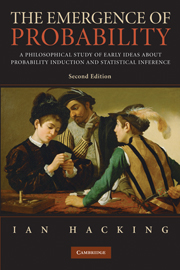 The Emergence of Probability
The Emergence of Probability Book contents
- Frontmatter
- Contents
- Introduction 2006
- 1 An absent family of ideas
- 2 Duality
- 3 Opinion
- 4 Evidence
- 5 Signs
- 6 The first calculations
- 7 The Roannez circle (1654)
- 8 The great decision (1658?)
- 9 The art of thinking (1662)
- 10 Probability and the law (1665)
- 11 Expectation (1657)
- 12 Political arithmetic (1662)
- 13 Annuities (1671)
- 14 Equipossibility (1678)
- 15 Inductive logic
- 16 The art of conjecturing (1692[?] published 1713)
- 17 The first limit theorem
- 18 Design
- 19 Induction (1737)
- Bibliography
- Index
10 - Probability and the law (1665)
Published online by Cambridge University Press: 05 April 2013
- Frontmatter
- Contents
- Introduction 2006
- 1 An absent family of ideas
- 2 Duality
- 3 Opinion
- 4 Evidence
- 5 Signs
- 6 The first calculations
- 7 The Roannez circle (1654)
- 8 The great decision (1658?)
- 9 The art of thinking (1662)
- 10 Probability and the law (1665)
- 11 Expectation (1657)
- 12 Political arithmetic (1662)
- 13 Annuities (1671)
- 14 Equipossibility (1678)
- 15 Inductive logic
- 16 The art of conjecturing (1692[?] published 1713)
- 17 The first limit theorem
- 18 Design
- 19 Induction (1737)
- Bibliography
- Index
Summary
No particular event, no single student, is responsible for the emergence of probability. In order to represent epistemic probability on a numerical scale the Port Royal Logic used gaming as its model. It may be tempting to infer that probability could be measured only by using concepts devised for games of chance. That would be a mistake. A gifted mind ignorant of the doctrine of chances but able to apprehend the fact that evidence and causation are in different categories could perfectly well start measuring epistemic probability. The proof of this is that Leibniz did.
In 1665 when he was 19 he published a paper using numbers to represent what he called degrees of probability. At that time he was isolated from the mainstream of European thought and he did not know much mathematics. His best teacher of that subject had been Erhard Weigel at Jena in 1663. Weigel certainly knew no theory of chances; indeed, he had not even mastered Cartesian geometry. Yet Weigel was a significant teacher. He held the commonplace idea that all knowledge should be axiomatized on a Euclidean plan, but he coupled this with a peculiar faith in arithmetic. He liked to toy with eccentric equations and non-standard arithmetics – he was especially proud of his system to the base 4. Leibniz's combinatorial imaginativeness was undoubtedly supplemented by this kind of tutelage.
- Type
- Chapter
- Information
- The Emergence of ProbabilityA Philosophical Study of Early Ideas about Probability, Induction and Statistical Inference, pp. 85 - 91Publisher: Cambridge University PressPrint publication year: 2006
